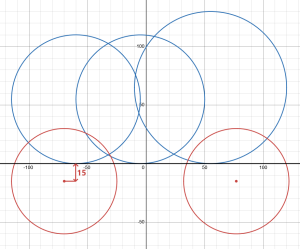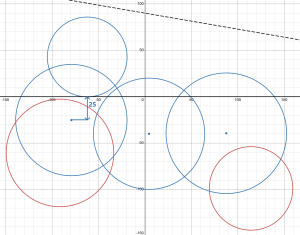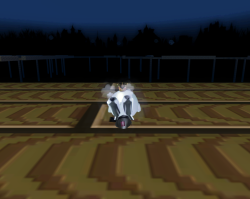Supersliding
| Other names | SS, WBSS, DDSS |
|---|---|
| Class | Glitch |
| Type | External Velocity Exploit |
| Date found | Unknown |
| Theoriser(s) | Multiple |
| Discoverer(s) | Multiple |
| Timesave | N/A |
Supersliding is an external velocity (EV) exploit that occurs when the player is on the ground, but is not touching the floor with any of their wheel hitboxes. This state of low traction allows the player to build EV through bike lean mechanics by repeatedly alternating between neutral and horizontal inputs. Like with other lean-based EV generation techniques, supersliding can only be performed on bikes. It can be performed in multiple ways, but the most common application is Wario Bike Supersliding (WBSS), a technique in which the Wario Bike rests on its unique tailpipe hitbox.
Prior to the inception of Wario Bike Supersliding, it saw very limited use, as the superslide state is very unstable on other bikes, which makes them unable to handle slope changes, tight turns, reversing, or even leaning too far in one direction. Since then, however, its usage rate has skyrocketed, with it seeing use on a large number of Unrestricted and No Ultra flaps, and even some 3laps as well. Automatic Transmission has since been adopted in some glitch categories as well, as the handling boost it provides enables tighter lines for supersliding.
Of the lean-based EV exploits, supersliding (specifically the WBSS variant) is the only exploit that is feasible to perform in real time, as the inputs required to build EV and maintain superslide state are comparatively much more lenient.
As all forms of lean-based EV exploits are considered glitches, supersliding is banned in no-glitch categories in both TAS and RTA environments.
Basic Mechanics
Low Traction State
In Mario Kart Wii, there are two natural ways for external velocity to decay over time:
- At all times, the player's current EV is multiplied by 0.998 each frame (in other words, they lose 0.2% of their current EV every frame), likely to simulate air resistance.
- When the player's wheels are touching the ground, an additional constant decay of up to ~7 U/F is applied. The amount of EV reduced seems to vary based on how many wheels are touching the ground and the relative size of each wheel, but the mechanics for this are not yet well-understood.
Notably, there is no additional penalty applied to EV when any of the player's body hitboxes touch the ground. This means that when the player is touching the ground, without allowing contact by any of their wheels, they lose EV as if they were in the air, but retain full control of their vehicle, including the ability to turn and repeatedly generate EV through leaning. This allows the player to stack EV indefinitely through leaning or other general means, so long as they are able to keep their wheels off of the ground.
External Velocity Building
External velocity is generated in a superslide through bike lean mechanics. As your bike leans in one direction, it generates EV in that direction as long as its lean rotation continues to increase. As your bike leans, it eventually reaches a lean rotation cap, and will no longer be able to lean any further, and you have to allow your lean rotation to decay by moving the stick back to neutral before attempting to lean more.
As such, the optimal way to generate external velocity is to lean continuously until the lean rotation cap is reached, then balance your inputs such that you are leaning as much as possible without attempting to lean past the lean rotation cap. This sequence of inputs differs depending on the bike and situation, as the game uses different values for the lean rotation speed and lean rotation cap depending on which type of bike you're using as well as which driving state you're in (IV speed, SSMT, drifting). When available, you can also begin a drift in the opposite direction to quickly reset your lean rotation, allowing you to build EV at full speed again shortly after.
For more information about bike lean mechanics, including optimal input sequences, <TODO link page or something and maybe add input table?>
Like with other low traction states, EV can also be obtained through interactions with collision, such as EV from gravity being redirected down slopes or applying EV from interactions with walls.
Hitbox Effects on Supersliding

When moving through a collision triangle from behind, such as road, a given hitbox sphere will collide with the triangle once it has passed about halfway through. This means that you will forcibly eject from a superslide once any of the hitboxes below the road passes more than halfway through the ground, and therefore the stability of a superslide correlates roughly with the smallest y-distance between the bottom of each body hitbox the vehicle rests on, and the center of the nearest wheel below.
The hitboxes of bikes in Mario Kart Wii vary quite widely, and therefore the ability of each bike to superslide does as well. Of the outside drifting bikes (ODBs), not a single one has enough space between at least one wheel and body to superslide conventionally. The only ODB that is capable of supersliding is the Wario Bike, due to a major hitbox exception. Because of this exception, supersliding using this method was given its own name of Wario Bike Supersliding (WBSS). Of the inside drifting bikes (IDBs), Dolphin Dasher is the most stable, and supersliding with it is sometimes referred to as Dolphin Dasher Supersliding (DDSS), despite it supersliding in the same manner as most other bikes. All other IDBs are able to enter superslide state in some capacity, though many eject as soon as they attempt to lean or touch slopes. Other passable supersliding candidates include Jet Bubble, Bullet Bike, Spear, and Flame Runner, though they are comparatively very fragile and there are few situations in which they are useful.
For a list of vehicle hitbox information and hitbox cross-sections, see this sheet by dm248. For a list of approximate supersliding ranges for each vehicle, see this sheet by Mikul.
Wario Bike Supersliding

Like other outside drifting bikes, the Wario Bike does not have enough space between its back wheel and lower body to allow it to superslide. However, unlike every other bike, it has a unique body hitbox on a layer above the rest, commonly referred to as the "tailpipe hitbox". The Wario Bike can instead rest on this tailpipe hitbox, moving the rest of the vehicle body through the ground.
This tailpipe hitbox is crucial for two main reasons. Firstly, compared to other supersliding bikes, this hitbox is both small and considerably detached from the rest of the main body, greatly increasing the y-distance between the bottom of it and the centers of nearby body hitboxes. The bike also leans forwards about 10 degrees (precisely -9.983338 degrees when resting) while in the WBSS state, so the much-closer front body hitbox becomes much less of a concern. Secondly, because it rests on only one body hitbox, it is far less sensitive to slope transitions, as there is no need for multiple body hitboxes to align with even small slope transitions to avoid ejecting.
These two key factors enable a wide variety of supersliding applications and optimizations, and are why Wario Bike remains the single best vehicle at supersliding by a very wide margin.
Better Slope Handling
Prior to the discovery of WBSS, the main limitation of supersliding was that it could only be performed on flat or near-flat ground. Wario Bike's hitbox differences largely solve this issue. Most other bikes could only handle slope transitions of a few degrees or less and could eject by simply ejecting on steeper slopes, but WBSS can be maintained on steep slopes and can even handle significant slope transitions, which allows it to be maintained for significant sections of many tracks.
When handling large slope transitions in WBSS, it is best to approach at a sideways angle. While the front hitbox is typically not an issue, its large horizontal distance from the tailpipe hitbox can cause it to collide with changes in slope before the tailpipe hitbox actually gets there. Likewise, navigating large downward transitions backwards can sometimes cause it to clip the road above once your bike's angle has adjusted to match the road below. Larger slope transitions, especially at high speeds, can often be a game of testing techniques and bruteforcing QM, so it's best to scope out any slope transitions that might be problematic beforehand.
Tighter Lines
Because of the large amount of wiggle room WBSS provides, it's also possible to take tighter lines than is normally possible with other bikes. In most situations, Wario Bike can afford to hold sideways inputs indefinitely, which allows it to take much tighter turns than previous iterations of supersliding allow, even across shallow slope transitions.
Reversing
(inverted turn direction + supertight turns)
Wall Bonks
(added EV on bonk, fast IV direction flip)
Hops
Unlike every other bike, the Wario Bike is also capable of hopping in a superslide without ejection, though this is limited to cases where you are either moving uphill or have significant roll when hopping.
This is primarily useful when navigating upward slopes. Normally, when moving up a slope, EV applied from gravity will be applied to your vehicle and redirected down the slope, which counteracts your existing EV. To remedy this, Wario Bike can hop during these upward sections to help offset the lost EV or even continue to gain EV.
One such variation is the application of rapid fire hop abuse and supergrind inputs to continuously handle shallow upwards slopes, sometimes informally referred to as superslidegrinding. Interestingly, the rules for maintaining rapid fire hop abuse and staying in the floor seem to differ from normal, with the global slope of the floor mattering more, as opposed to the upward change in slope that is usually required for rapid fire hop abuse.
Another variation is the use of repeated spindrifts while in the floor to quickly build up EV when at low amounts, to quickly get the player to the speed cap. This is sometimes referred to as driftsliding or superslidehopping, depending on the exact implementation. When this technique is used, Dry Bowser is sometimes used for his high offroad stat, as it's just barely enough to push the Wario Bike's offroad speed above its minimum drift speed, which enables the use of drifts to build EV while in offroad.
Additional Variants
Autosliding
Autosliding, also known as Auto Driftsliding, is a supersliding technique performed on Automatic Transmission, in which the player uses Automatic drifts repeatedly to gain EV at a much higher rate than is typically possible with supersliding.
This works because to begin an automatic drift, the player simply needs to be holding a horizontal input of 6 or above for 12 frames, and the game does not care about which direction is actually being held. Because of this, the player can hold one direction to lean all the way up to the lean rotation cap, and then flip their input all the way in the opposite direction on the frame that the drift counter reaches 12 to begin a drift in the opposite direction, thereby resetting their lean rotation. This can be repeated indefinitely, allowing a much higher rate of EV gain, and consequently a higher effective EV cap as well.
However, there are two main drawbacks that prevent Autosliding from seeing mainstream use. Firstly, as it is performed on Automatic, the player is unable to hop, which locks them out of some major techniques like Supergrinding and Superhopping, as well as other minor time-saving maneuvers. In addition, Autosliding for extended periods requires a much stricter trajectory than typical WBSS, and can only be done with positive IV, which limits its ability to save time over typical supersliding outside of setups.
This variation was discovered by <Monster? needs verification>, and is most notably being used for a WIP ultra flap on DS Peach Gardens that could save several seconds over the current unrestricted BKT.
Headsliding, Cranium Sliding, whatever (name pending)
The low traction state also applies to any vehicle that is upside-down, as though the wheels are no longer below the floor, they are still not touching it. However, achieving this severe of a rotation often requires the use of Barrel Roll State, which prevents the player from being able to control the lean of their vehicle. As such, the only reliable way to gain EV in this state is to use slopes to redirect the downwards EV obtained via gravity.
Currently, this technique is exclusively useful alongside Wheelchair, as even small amounts of EV gained from slopes can significantly increase the speed you can travel across Solid Out of Bounds collision. This technique was first applied by Justin to improve the DS Desert Hills ultra flap by multiple seconds following the initial discovery of the Wheelchair ultra, but it has since been obsoleted.
Magikruiser Tailpipe Supersliding
Similarly to the Wario Bike, the Magikruiser has its own tailpipe hitbox. However, the Magikruiser's tailpipe extends directly behind the bike, rather than above it. This allows it to perform superslides while hanging off of ledges, which is useful when a seam you need to superslide on is otherwise blocked by a wall below.
This variation was first used by Mikul on his Superstar Dystopia ultra flap. It was required to circumvent the IV cap of Solid Out of Bounds and achieve a respawn that would not have otherwise been possible by supersliding on a walled-off seam.
Wheelie Supersliding
Some longer vehicles, such as the Spear, are capable of entering a low-traction state by getting only their back wheel stuck in the floor and repeatedly performing wheelies to lift the front wheel off of the ground. This is an extremely limited technique, and there are currently no known practical use cases.
History
2012–2015: Initial Discovery
<TODO idk tbh someone is gonna have to help me out here>
2016: Wario Bike Discovery
<TODO cyanmk>
2021–2023: Minor IDB Applications
<TODO calidae desert, snes bc2>
2023–Present: Full Potential Realized
<TODO justin reminding us wario bike exists, monster on TF, autosliding, minor DDSS usages>
2025-Present: RTA Developments
Beginning in 2023, Ejay B began looking for ways to apply supersliding RTA, despite the low potential for RTA-viable setups. Over the next two years, he used TAS to conceptualize an RTA-viable method of supersliding to beat the current flap world record on Luigi Circuit, and began attempts to execute his ideas shortly after. On August 10th, 2025, he revealed this flap world record in a video covering the history of supersliding and his attempts, marking the first ever RTA usage of supersliding on a Nintendo track, as well as Luigi Circuit's first ever glitch category after 17 years.
Weeks later, on August 30th, 2025, RTA player flambambam managed to execute the superslide setup fast enough to achieve the first ever glitch world record in a 3lap on Luigi Circuit with a time of 1:08.126. Over the next few months, flambambam and another runner, JC, worked to push this time down another 3 seconds, implementing developments like Automatic.
In the coming months, JC also began supersliding attempts on N64 Mario Raceway following suggestions made by TASers. While both the setup and execution of the superslide are more difficult than they were on LC, JC set the first ever glitch flap world record on September 27th, 2025, and later pushed the flap time much lower than the no-glitch world record.
Applications
| Type | Unrestricted | No Ultra | No Glitch |
|---|---|---|---|
| 3lap | Yes | Yes | Banned |
| Flap | Yes | Yes | Banned |
Supersliding is currently used in many 3lap and flap categories, and is used both on its own and to perform the following strats:
- DC fountain skip[1]
Supersliding has also been used in TASes on the following custom tracks:
References
- ↑ [https://www.youtube.com/watch?v=uwTk9l81CdQ "[MKWii TAS] Daisy Circuit Fast Lap (No Ultra, Supersliding) - 20.675" by Monster, Alego11, César, clem, Ejay B, and Marth
